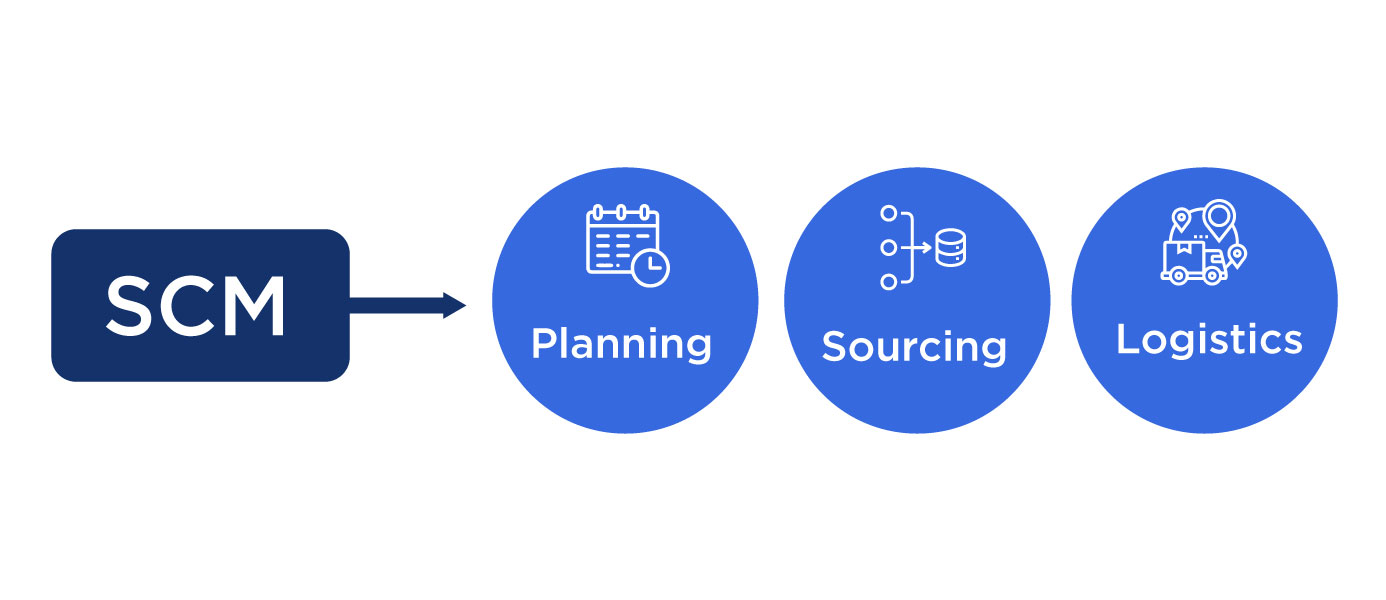Ever wonder how things actually land before your doorstep whenever ordered over the internet? How would any restaurant ever get fresh supplies at your table every single day? Everything is followed up by a single process known as supply chain management (SCM), which is one of the main parts of the business itself.
Let's look deeper into what exactly this SCM is, the necessity within our daily lives, and importance played by ethics in conducting an effective SCM process itself.
What is Supply Chain Management (SCM)?
Supply Chain Management (SCM) is the process that oversees how a product or service is made, moved, and delivered from the supplier to the final customer. It includes everything from the very beginning to the end. It includes different types of activities.
Key Components of SCM:
SCM is a multidimensional process that involves different key components:
Planning:
- Forecasting Demand: The initial step is to check what needs to be done and how to do it.
- Inventory Management: Here, companies decide how much stock they require to keep and plan when they should reorder the materials.
- Production Planning: In this process, a prediction is made for when to schedule the production, how much material is required, and how to distribute the products.
Sourcing:
- Choosing Suppliers: It includes searching for and collaborating with suppliers to source raw materials or products.
- Negotiating Contracts: Businesses work out prices and terms with their suppliers.
- Managing Relationships with Suppliers: This means building strong connections with suppliers to ensure quality, low costs, and timely deliveries.
- Production Processes: Once the materials are sourced, the production of products is initiated.
- Scheduling: Here, the actual production process happens. All the required processes are scheduled.
- Quality Control: in this process, the efficiency of products is ensured. It is checked that the product is meeting the customer’s demand and is manufactured in adequate amounts.
Logistics:
Warehousing: After production, the product is stored in a warehouse or distribution center for the next steps. It involves bringing products into the customer's hands as the final process of SCM through different modes of transport.
Why Is Supply Chain Management Important?
SCM has an impact on every part of business, whether it is regarding cost or inventory levels; further, it also measures customers' satisfaction. Let us verify why SCM matters for every business:
- Efficiency and Cost Control: As a smooth supply chain helps to reduce waste, it increases efficiency, which reduces the cost of operation.
- Inventory Management: SCM helps to avoid overstocking. It makes sure that the products are delivered to customers at the lowest possible cost.
- Customer Satisfaction: Customers want high quality products and expect fast deliveries for same. Having a strong supply chain can meet these expectations. Weak supply chains lead to product delays and have fear of stock shortages.
- Competitive Advantage: Companies having efficient supply chains are able to respond faster to the requirements of their customers who maintain efficient supply chains.
- Globalization and Growth: With the expansion of businesses, it is important to manage supply chains effectively. It is essential to source products and materials from the global market while ensuring quality, speed, and compliance.
Why to Consider Ethics in SCM?
While SCM focuses on efficiency and profit, it also involves ethical issues. The choices made in the supply chain can impact working conditions and environmental sustainability. A responsible supply chain delivers products fairly and sustainably. There are some key ethical issues in SCM, they are as follows:
- Working Conditions: It makes sure fair labor practices in the SCM process.
- Environmental Impact: In all the supply chain activities minimize the harm to the environment.
- Fair Trade: Supporting ethical sourcing practices to ensure fair treatment for producers.
- Labor Rights: Many companies source their products from countries with lower wages, but this sometimes leads to poor working conditions or child labor and unfair wages. Ethical companies will ensure that the supply chain partners respect workers' rights and fair labor practices.
- Sustainability: Since a growing population of society is conscious about the environment, it makes a company consider what their supply chain is doing to the earth. In other words, it reduces waste, makes use of sustainable packaging, and its suppliers are ecologically friendly in action.
- Transparency and Fair Trade: Modern consumers care more than ever where their products come from. Ethical supply chains are transparent, which means companies openly share information about what they source and show that they’re committed to fair trade and ethical business practices.
- Supplier Relationships: Ethical supply chain management is about creating strong and honest relationships with suppliers. This means paying fair prices, keeping promises, and collaborating to solve problems.
It is important to be ethical in SCM. Brands that maintain high ethical standards gain the trust of their customers. This leads to loyalty and long-term success for businesses with customers.
The Bottom Line: Supply Chain Management Powers Our World
Supply chain management sounds like some dull, backroom function, but in reality, it forms the backbone of any organization. It affects cost, efficiency, and customer experience, and when it's done right, it becomes a source of competitive advantage for any company.
But there is much more than just the efficiency of running operations. Responsibility in making, sourcing, and delivering products also reflects the commitment to ethics, which forms the core of SCM. Whether it has to do with paying proper wages, contributing to a reduction in pollution, or being clear on customer matters, responsible SCM is what makes this world better with products.
Next time you open a new gadget, order food online, or grab your favorite product from the store, take a moment to appreciate the amazing work that goes into SCM. Without it, everything in our world wouldn’t run as smoothly.
To get such informative blogs, explore KnowledgeNile!
FAQ
- What is supply chain management and its importance?
Supply chain management (SCM) manages how products move from suppliers to customers, which is important for cutting costs and keeping customers happy. It helps businesses run smoothly and meet customer needs effectively. - What is the impact of supply chain management?
The impact of SCM includes better coordination among partners, faster delivery times, and increased profitability. This leads to stronger relationships and more reliable service. - What are the impact and function of supply chain?
SCM functions involve planning, sourcing, making, delivering, and returning of the products. All this works together to optimize the supply chain and makes sure that everything is efficient and cost-effective.
Read More:
Digital Twin In Supply Chain: How Can It Transform The Industry






